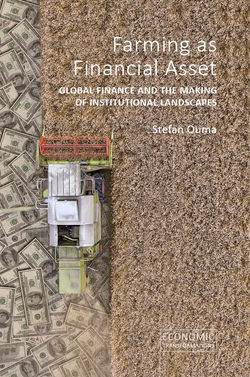Читать книгу Farming as Financial Asset - Stefan Ouma - Страница 8
На сайте Литреса книга снята с продажи.
ОглавлениеAcknowledgements
The fieldwork informing this book took me to many different corners of the world: the United States, the United Kingdom, Germany, Tanzania, Singapore, Australia, Kenya and Aotearoa New Zealand. This journey reflects the globe-spanning networks of modern money management, which touch many sites at once, ever keen to carve out value from a place and redistribute it elsewhere. The connections that made my encounters possible were dependent on the generosity of many people, who, in one way or another, all facilitated my research, the production of the book or a critical review of parts of it.
Many people in the money management industry (asset managers, farm operators, different service providers, pension fund representatives) have shared their scarce time for interviews or field visits, and most of those approached were remarkably open about such requests. Although not all of them may agree with some of the arguments made in this book (which themselves have evolved over time), I hope they gain something from reading it. Among the many asset and farm managers interviewed, a few individuals in Tanzania, Aotearoa New Zealand, Australia, Germany and Singapore were extraordinarily generous with their time, and deserve special thanks. They know who they are.
I also wish to thank many other people who contributed to this project. Peter Lindner of Goethe University (Frankfurt) has been supportive throughout my career, ever since we started working together in 2007. My colleagues Julian Stenmanns, Iris Dzudzek, Alex Vorbrugg, Tim Brückmann and Mara Linden have provided critical feedback on various parts of this book. In the United States, a number of people were very helpful in facilitating my research, including Professor Bruce Sherrick at Illinois State University.
Many insights related to my Aotearoa New Zealand case studies benefited enormously from discussions with Nick Lewis, Richard Le Heron, Matt Henry, Mike Roche, Russel Prince, Christina Stringer, Ann Pomeroy, Christina Berneheim and Wendy Larner. Harvey Perkins and Geoff Lawrence were both extraordinarily generous, providing feedback on several of the draft chapters at an early stage. Tobias Klinge, now a PhD student at the University of Leuven, conducted excellent research on the regulation of foreign investments in Aotearoa New Zealand forestry and agriculture as part of a master’s study supervised by me at Goethe University in 2018. His work informs several parts of this book. In Tanzania, Mangasini Katundu of Moshi Cooperative University, a partner in the project funded by the German Research Council that partly informs this book, particularly assisted with fieldwork. Dennis Malele of the same institution provided additional findings on one of the Tanzanian case studies. Many other people had their fair share in facilitating my research there, including Emmanuel Sulle, Brian Cooksey, Martina Locher, Hazel Gray, Andrew Coulson, Faustin Maganga, Esther Towo and the great team at COSTECH.
This book would also not exist without the “technical” support of Frieda Gresch, Petra Turba, Elke Alban, Thea Fechner, Alexander Melchert, Julia Blauhut, Ian Copestake and Susan Askvik. This technical support also includes some quite “big players”. Market intelligence providers Savills (London) and Valoral Advisors (Luxembourg) kindly shared data on the “AG investment” space with me, and Preqin (London) and Agri-Investor (London), two other data service providers, gave me special subscription deals within the range of my research budget. That I had this budget at all is thanks to the German Research Council, which funded a part of the underlying research between 2017 and 2020 (grant no. 363300598). Other sources of financial support were the Centre of African Studies, via the support of Marc Boeckler at Goethe University and the chair of economic geography at the same institution (again, thanks to Peter Lindner!). I am also glad that some investment conference organizers had mercy on me and let me take part at their events at reduced rates.
Finally, I would like to thank the team at Agenda, Steven Gerrard and Alison Howson, and two anonymous reviewers, as well as the editors of Agenda’s Economic Transformations series: Jamie Peck, Brett Christophers, Rebecca Lave and Marion Werner. Without their encouragement, I would probably never have written this book. In particular, Brett’s work has had a huge influence, and I am glad that both our interests have recently converged around the finance–land nexus (for him, more public land, though).
A note of extra thanks goes to some very special people. During my research, and the writing of this book, my partner Eva and daughter Adele Akinyi, joined by Amina Luz in October 2019, had to cope with my partial physical and mental absence. I do not take such sacrifices for granted, and would like to thank them for their love and patience.
Stefan Ouma
Bayreuth
